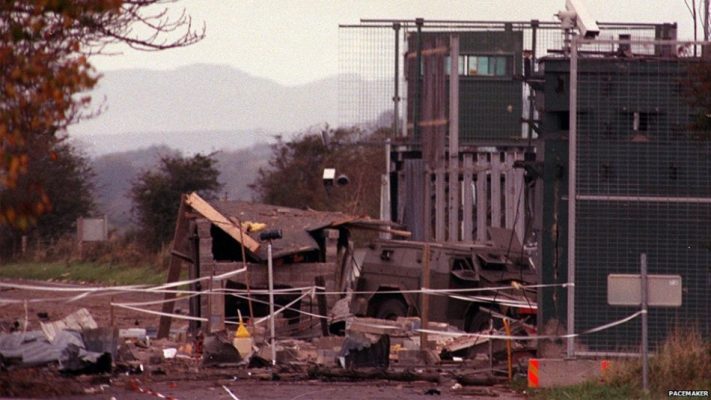
British Army checkpoint at Buncrana Road Derry blown up in October 1990 by IRA ‘human bomb’ which claimed the life of Patsy Gillespie who was strapped into bomb-laden car
It is already running more than a year behind schedule.
Mr Justice McAlinden, the head of the panel ruling on who qualifies for the scheme, said he had held a “constructive meeting” with victims’ groups.
A dispute over how the pension should be funded was recently resolved following a legal challenge.
Earlier this month, Stormont’s Executive Office formally pledged to pay for the pension, despite arguing that Westminster should foot the bill as it passed the initial legislation allowing the scheme to be created.
The estimated outlay for the scheme, over the next 20 years, could be up to £1.2bn.
Finance Minister Conor Murphy has said his department would make the necessary funding available to ensure eligible victims and survivors receive compensation, but warned it could have consequences for other departments’ budgets in future.
On Tuesday, Mr Justice McAlinden said he was “delighted” to announce a date for the scheme to open for applications.
“As president I have worked closely with the recently appointed board members and the team established by the Department of Justice to develop the administrative arrangements for the payment scheme,” he said.
“I have also held a number of constructive meetings with representatives from the main groups supporting the victims of the Troubles.
“This has helped to establish positive working relationships which should enable victims to have trust in the board.
“The many victims deserve the recognition and payments to which they are entitled.”
To qualify for annual payments of between £2,000 and £10,000, individuals must have suffered a severe and permanent physical or psychological injury caused through no fault of their own.
It is anticipated there could be as many as 30,000 applications in total and the process could take years to work through.
The scheme could run for up to 30 years, with payments transferring to an individual’s spouse or carer upon their death.
The legislation came on to the statute book in January 2020. To qualify, you have to have an injury which is severe and permanent and caused by no fault of your own.
This can be physical injury, such as a loss of limbs, or psychological, caused by being present at a bombing, for example.
The scheme covers violence related to the North of Ireland Troubles between 1966 and 2010, including incidents in GB and Europe.
Non-UK residents injured outside the UK cannot apply – such as victims of the Dublin and Monaghan bombings carried out by loyalists in 1974.
People will get between £2,000 and £10,000 a year for the rest of their lives.
Upon their death, a spouse or carer, will get the payments for a further 10 years.
The scheme is a recognition that criminal injuries awards from decades ago were largely inadequate.
Tags:




